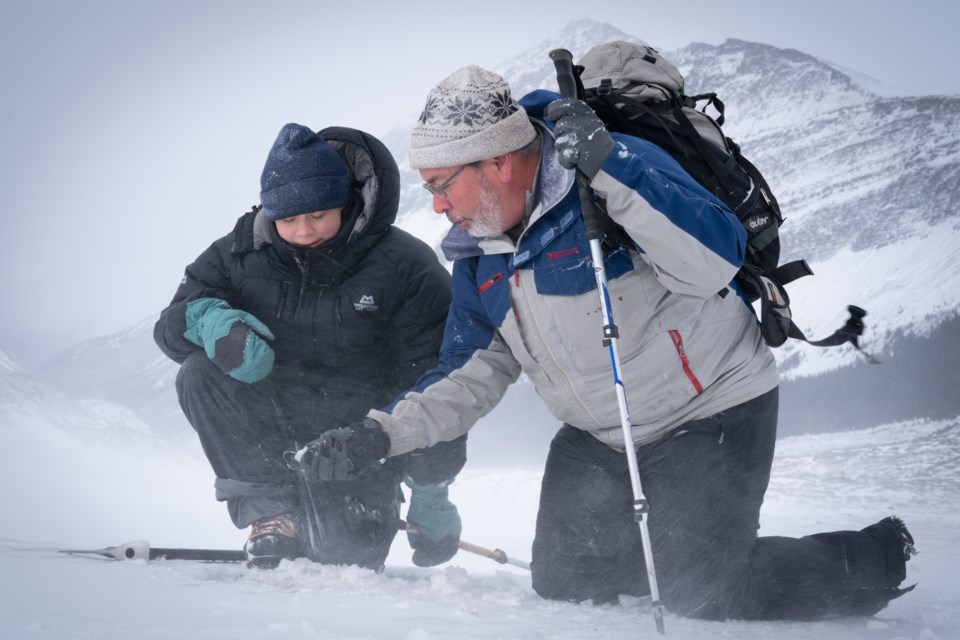JASPER – The weather was cold, windy and unpleasant, as it frequently is in the Columbia Icefield area of Jasper National Park in October, but that didn’t deter teen climate activist Greta Thunberg from spending several hours learning about how climate change is affecting the Athabasca Glacier.
Thunberg, who is touring North America on an extended trip from her home in Sweden – having crossed the Atlantic via a two-week voyage aboard a zero-carbo yacht – was provided a guided tour on the Rockies most visited glacier courtesy of John Pomeroy, Canada Research Chair in Climate Change and director of the Global Water Futures. Led by the University of Saskatchewan, GWF is the largest university-led water security research project in the world.
The entourage included research technician Greg Galloway and graduate student Caroline Aubry-Wake, both from the Canmore-based USask Coldwater Lab, and media specialist Mark Ferguson from the Global Institute for Water Security. Thunberg’s father, Svante was also part of the group that was kept safe by ACMG mountain guide Dave Stark.
The sixteen-year-old Thunberg was well-prepared and asked questions about the effects that climate change is having on the rate of the glaciers’ decline.
The reasons for that decline, Pomeroy told her, were “due to the effects of climate change, specifically more rainfall and less snowfall, warmer temperatures, greater ice exposure on the glaciers and now accelerating due to dust, soot and algae darkening the glacier surfaces.”
While the harsh weather kept them from walking farther onto the glacier, the group hiked up to a spot from where Thunberg could see the research stations where scientists record data, as Pomeroy offered his insight about how rising carbon dioxide levels are impacting the planet.
“I told her that glacier melt has accelerated in recent years due to climate change and that we have crossed a tipping point with lower ice reflectance due to wildfire soot and algae that have caused 6.1 metres of ice melt this year on the Athabasca below the icefall,” Pomeroy said. “That’s the greatest melt we have ever measured, and despite a slightly cooler summer than recent exceptionally warm summers.”
One question she asked Pomeroy was how he felt about the glaciers melting.
“I told her that as a person it was like losing my home, and as a scientist it was interesting, but terrifying to try to predict how this will go over the next century when our understanding of glacier and high mountain hydrology is still incomplete," he said.
Having previously visited high mountains in Sweden, Thunberg hadn’t before experienced a glacial environment on the scale of the Athabasca, one of six major outlet glaciers descending from the Columbia Icefield.
For her part, Thunberg appeared grateful for her day amidst the Rockies ancient ice, tweeting: “Thank you to John Pomeroy, the University of Saskatchewan, Brenda Shepherd and Parks Canada for educating me on the effects of the climate and ecological crisis in stunning Jasper National Park. And thank you for giving me these incredible experiences!”
She also left an impression on those accompanying her.
“I spent the day with her listening to her interact with several scientists,” Stark said in a social media post. “She was on par with the PhD students in her questions and understanding of the answers. She is one smart on-point woman.”
Since she first captured public attention in 2018 by launching a solo school strike to protest political inaction against climate change, Thunberg has inspired millions around the world to participate in strikes and other actions in 150 countries. Recently included in Time magazine’s list of 100 of the most influential people of the past year, Thunberg has spoken at the United Nations headquarters, the U.N. climate summit and the World Economic Forum, sharing her message that people and governments need to listen to what scientists are telling the world about climate change.
“She has done more than any other person to raise awareness of climate change science,” Pomeroy said. “She has suggested that people focus on the science and listen to scientists and this is good for society, as we can help find solutions to extreme weather, climate change and the impacts on snow, ice and water.”



